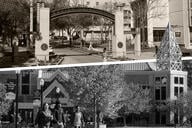You have /5 articles left.
Sign up for a free account or log in.
In a major victory for religious colleges, a federal appeals court ruled Wednesday that Colorado may not distinguish between sectarian and "pervasively sectarian" colleges to deny state funds to students in the latter category. Such distinctions, the court ruled, amount to illegal state preferences for some religious groups over others.
The ruling is a direct challenge to a standard that has in the past been used by many states to limit state support for religious institutions. But the ruling comes at a time that such distinctions may be falling. Just last year the California Supreme Court ruled that the state could not bar pervasively sectarian universities from participation in programs in which government agencies issue bonds on behalf of colleges.
Wednesday's ruling by a three-judge panel of the U.S. Court of Appeals for the 10th Circuit came in a suit filed by Colorado Christian University against the state for denying the institution's students access to state student aid programs. Colorado law specifically allows aid to students at religious institutions that are not pervasively sectarian. As a result students at Roman Catholic and Methodist colleges in the state are eligible.
Colorado Christian has students from many denominations, but that the institution takes faith seriously has never been in dispute. Students must sign a pledge to emulate "the example of Jesus Christ and the teachings of the Bible," traditional age undergraduates must attend chapel weekly, and faculty members must sign a statement of faith that declares the Bible to be infallible.
While Colorado officials examined these and other characteristics of the university to determine that it is pervasively sectarian, the appeals court ruled that that judgment was irrelevant and that the state had no business ruling that one college was too religious to qualify for aid, while another was not.
"The sole function and purpose of the challenged provisions of Colorado law is to exclude some but not all religious institutions on the basis of the stated criteria," the court ruled. "Employing those criteria, the state defendants have decide to allow students at Regis University, a Roman Catholic institution run by the Society of Jesus, and the University of Denver, a Methodist institution, to receive state scholarships, but not students at CCU or Naropa University, a Buddhist institution. This is discrimination...."
The court noted U.S. Supreme Court rulings upholding the rights of states to deny aid for theological training, but noted that the law upheld applied to all such training, not just the training offered by some religious groups.
The appeals court also criticized the Colorado statute and regulations for putting the state in a position of evaluating religious groups. For example, one test used in Colorado has been whether theology courses "tend to indoctrinate or proselytize." To evaluate Colorado Christian University, state officials reviewed syllabuses from some theology courses. For the state to try to determine whether a course indoctrinates students in a religion constitutes "intrusive religious inquiry" in a way that many court rulings have rejected, the appeals court ruled.
The ruling linked this issue to debates over the politics of professors at secular institutions as well -- and questioned how the state could decide when religious education is appropriate and when it amounts to indoctrination.
"Anyone familiar with the varied reactions to The New York Times and FOX News knows how often assessments of objectivity and bias depend on the beholder. Many courses in secular universities are regarded by their critics as excessively indoctrinating, and are as vehemently defended by those who think the content is beneficial," the ruling said. "Such disagreements are to be expected in a diverse society. But when the beholder is the State, what is beheld is the exercise of religion and what is at stake is the right of students to receive the equal benefits of public support for higher education, the Constitution interposes its protection. The First Amendment does not permit government officials to sit as judges of the 'indoctrination' quotient of theology classes."
The Alliance Defense Fund, which backed the university in the case, praised the ruling for upholding the principles that "Christian schools should not be discriminated against because of their beliefs."
Barry Lynn, executive director of Americans United for Separation of Church and State, in an interview Wednesday night, agreed that the decision was significant, but criticized it as part of "an erosion" of the rights of Americans not to support religious education and belief with which they disagree.
"This will support universities set up precisely to promote the faith, and now they will be promoting it with tax dollars of people who disagree with their view," Lynn said.




